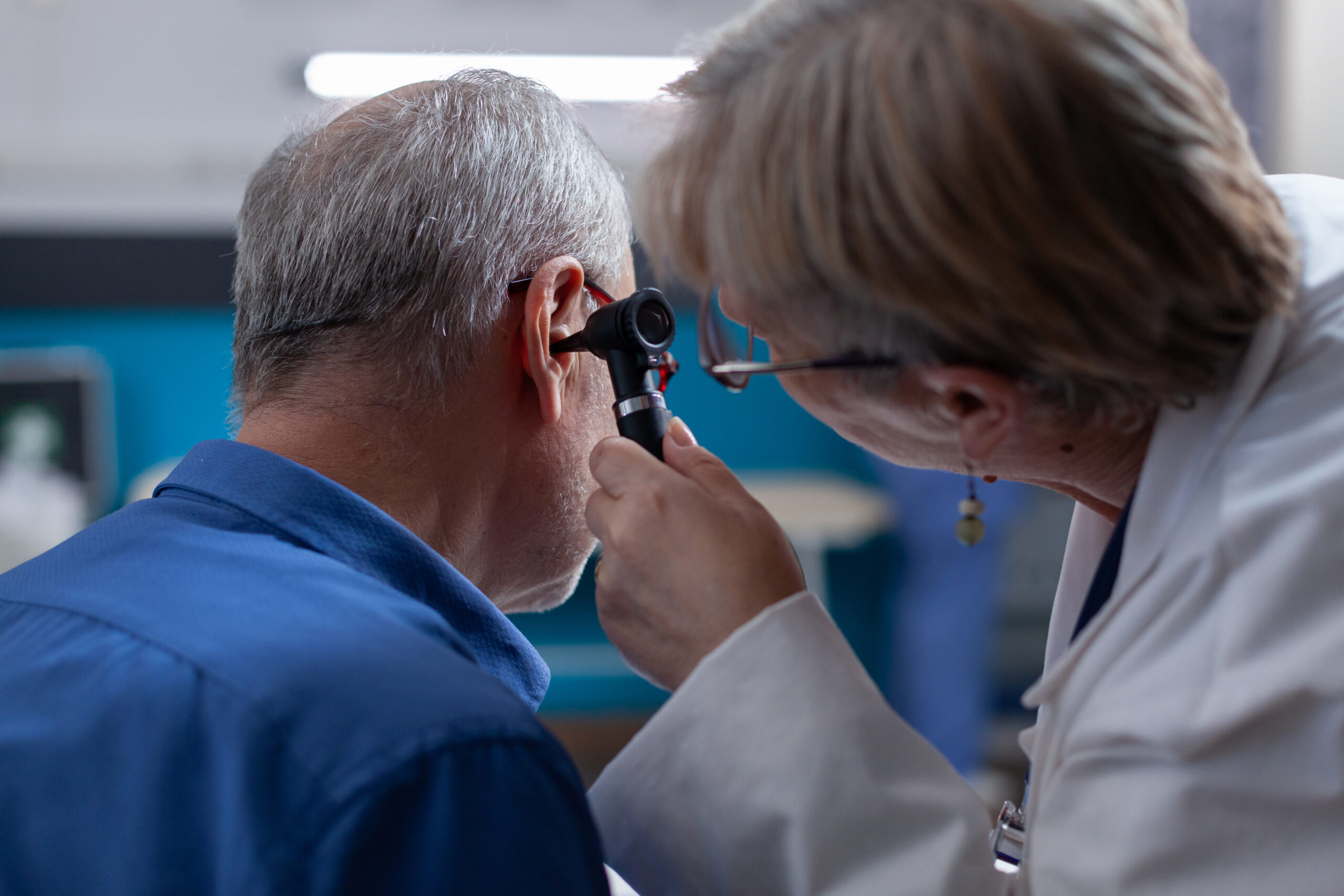Table of Contents
Ear infections are among the most common health issues, especially in children, though adults can be affected too. While often seen as minor and temporary, recurring or untreated ear infections can lead to more serious complications, particularly hearing loss. Fluid buildup, inflammation, and middle ear damage can reduce hearing ability over time or even cause permanent impairment.
In this blog, we’ll explore the link between ear infections and hearing loss, highlight key symptoms to watch out for, and share tips on how to protect your ears and preserve your hearing health for the long term.
What Is an Ear Infection?
An ear infection is typically caused by bacteria or viruses that lead to inflammation and fluid buildup in the middle ear (the space behind the eardrum). It can be acute (short-term) or chronic (recurring over time).
Common Types of Ear Infections
- Otitis Media: Infection of the middle ear, often seen in children.
- Otitis Externa: Also known as “swimmer’s ear,” it affects the ear canal.
- Chronic Suppurative Otitis Media: A long-lasting middle ear infection that often causes persistent ear discharge.
In most cases, ear infections are treatable. However, repeated or severe infections can cause complications, including temporary or permanent hearing issues.
How Ear Infections Affect Hearing
The ear is a delicate system made up of the outer ear, middle ear, and inner ear. When an infection strikes the middle ear, it can lead to inflammation, fluid buildup, and pressure changes—all of which can affect how sound travels.
Hearing Loss From Infection
A hearing drop from infection is usually due to the buildup of fluid behind the eardrum. This fluid disrupts the vibration of the eardrum and the small bones (ossicles) in the middle ear, which are essential for transmitting sound to the inner ear.
Signs of a hearing drop due to infection include:
- Muffled hearing
- Pressure or fullness in the ear
- Trouble hearing soft sounds
- Needing to increase volume on devices
Fortunately, if treated early, this type of hearing loss is often temporary.
Ear Fluid and Hearing: What’s the Connection?
Ear fluid and hearing are closely related, especially in cases of otitis media with effusion, where fluid remains trapped in the middle ear even after the infection has cleared. This fluid acts as a barrier to sound, causing conductive hearing loss.
Why Fluid Builds Up
- Poor Eustachian tube function (common in children)
- Allergies or upper respiratory infections
- Anatomical issues in the nasal or sinus passages
If this fluid persists for several weeks or becomes chronic, it may require drainage through medical procedures like the insertion of ear tubes.
Symptoms of Fluid-Related Hearing Loss
- Sensation of fullness or popping
- Inconsistent hearing
- Difficulty understanding speech
- Balance issues
If you suspect fluid is affecting your hearing, a hearing test can help assess the extent of the problem.
Chronic Ear Infections and Hearing
Chronic ear infections are defined as infections that either don’t completely go away or recur frequently over months or years. Over time, chronic ear infections and hearing loss often go hand in hand due to ongoing damage.
How Chronic Infections Affect Hearing
- Damage to the eardrum (perforation)
- Erosion of the ossicles (small middle ear bones)
- Scarring in the middle ear (tympanosclerosis)
- Risk of inner ear involvement leading to sensorineural hearing loss
Long-Term Risks
- Permanent hearing loss
- Speech and language delays in children
- Learning difficulties
- Social isolation and communication issues in adults
Treatment options may include antibiotics, surgery (like tympanoplasty or mastoidectomy), and long-term monitoring.
Explore hearing implant options if chronic infections have led to irreversible damage.
Can Hearing Loss from Ear Infections Be Reversed?
The good news is that in many cases, hearing loss caused by ear infections is reversible, especially if treated promptly. However, when infections are left untreated or become chronic, permanent damage can occur.
Temporary vs. Permanent Hearing Loss
Type of Hearing Loss | Cause | Reversible? |
Conductive | Fluid buildup or blockage | Often reversible |
Sensorineural | Damage to the inner ear | Usually permanent |
Mixed | Both types | Depends on cause |
If you or your child has frequent infections or signs of hearing loss, early diagnosis through pure tone audiometry can make a big difference.
Signs You Should See a Doctor
Early treatment prevents long-term damage. You should seek medical attention if you experience:
- Hearing loss that lasts more than a few days
- Persistent fluid in the ear
- Recurring ear pain or infections
- Ear discharge or foul odour
- Balance issues or dizziness
An ENT specialist or audiologist can evaluate the issue with advanced tools like tympanometry and suggest appropriate treatment.
Diagnosing Hearing Loss from Ear Infections
Audiologists use a combination of methods to determine the type and extent of hearing loss caused by infections.
Common Tests
- Otoscopy: Visual exam of the ear
- Tympanometry: Measures eardrum movement and middle ear pressure
- Audiometry: Assesses hearing sensitivity across frequencies
- ABR/ASSR Tests: Evaluate how sound signals are processed by the brain (useful for infants)
Learn more about these tests at The Hearing Centre Singapore.
Treatment Options
Medical Treatments
- Antibiotics or antifungal drops for acute infections
- Decongestants or antihistamines if allergies are involved
- Pain relievers for comfort
Surgical Interventions
- Myringotomy: Small incision in the eardrum to drain fluid
- Tympanostomy tubes: Help prevent fluid build-up
- Tympanoplasty: Repair of a perforated eardrum
- Ossiculoplasty: Reconstruction of damaged middle ear bones
Hearing Support Devices
If hearing loss persists after treatment:
- Hearing aids can improve sound clarity.
- Bone conduction devices may be suitable if the middle ear is damaged.
- Cochlear implants might be considered in severe cases.
Explore cochlear implant services for advanced hearing loss solutions.
Prevention Tips: How to Protect Your Ears
While not all ear infections are preventable, there are steps you can take to reduce your risk and protect your hearing.
Hygiene and Habits
- Avoid inserting objects into your ears (including cotton buds).
- Dry your ears gently after swimming or bathing.
- Don’t smoke or expose children to secondhand smoke (which increases infection risk).
Health and Immunity
- Treat colds, allergies, and sinus infections early.
- Ensure children get recommended vaccines like pneumococcal and flu shots.
- Breastfeeding infants can reduce the risk of early ear infections.
Regular Check-Ups
- Get regular hearing tests, especially after an ear infection.
- Follow up with an ENT if infections are frequent.
Hearing Health in Children
Children are especially vulnerable to ear infections due to their developing immune systems and Eustachian tubes. Hearing loss in childhood can affect:
- Speech and language development
- Learning and academic performance
- Social interaction
If your child is frequently saying “What?” or turns the TV up loudly, consider a full hearing evaluation.
Visit The Hearing Centre Singapore for pediatric hearing assessments and support.
When to Consider Hearing Aids
If hearing loss becomes permanent due to ear infections, hearing aids can offer significant help. Modern devices are discreet, comfortable, and highly effective.
Types of hearing aids that may help:
- Behind-the-ear (BTE): Suitable for moderate to severe hearing loss
- In-the-ear (ITE): Custom-fit and nearly invisible
- Bone-anchored devices: For chronic ear infection patients who can’t use traditional aids
Check out options like Signia, Phonak, or Starkey for advanced technology.
Conclusion
Hearing loss and ear infection are more connected than many people realise. A simple infection, if untreated or recurring, can result in serious hearing challenges. The good news? With timely diagnosis, proper treatment, and regular care, most people can recover without long-term issues.
If you’re experiencing any symptoms of ear infections or hearing loss, don’t wait. Schedule an evaluation with the specialists at The Hearing Centre Singapore to get professional advice, testing, and treatment tailored to your needs.
Frequently Asked Questions
Yes, infections can cause temporary hearing loss due to fluid and inflammation. In rare cases, especially if untreated, it may become permanent.
Most hearing loss resolves within a few days to weeks after the infection clears. If fluid lingers or complications arise, it may last longer.
Fluid in the middle ear blocks sound from reaching the inner ear effectively, causing temporary conductive hearing loss.
Yes, chronic infections can lead to eardrum damage, bone erosion, and long-term hearing loss if not treated properly.
Watch for signs like delayed speech, inattentiveness, or needing high volumes. Schedule a pediatric hearing test if you’re concerned.
Often yes, especially when treated early. However, chronic or severe infections may lead to irreversible damage.
Absolutely. Though more common in children, adults can get infections due to allergies, sinus issues, or water exposure.
Fullness in the ear, popping sounds, muffled hearing, and balance problems may indicate trapped fluid.
In some cases, surgical treatments like tube insertion or tympanoplasty may be necessary, especially if other treatments fail.
Visit The Hearing Centre for a complete hearing evaluation and follow-up care.

Evlin is passionate about helping people with hearing loss. With years of experience in audiology, she has diagnosed and treated a wide range of hearing conditions across all age groups. She is accredited to conduct comprehensive hearing assessments and provide treatments for patients from newborns to the elderly. Committed to personalized care, she strives to empower patients to fully engage in life with better hearing.
Designation: Clinical Audiologist
Qualification: Bachelor of Health Science (Honours) (Audiology), University of Science Malaysia
Membership: .Society of Audiology Professionals in Singapore (SAPS)
